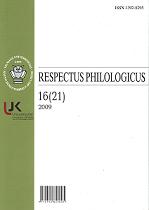OБ ОСОБЕННОСТЯХ КАРТИНЫ МИРА, ЗАПЕЧАТЛЕННОЙ В ЛИТОВСКИХ И РУССКИХ ЗООФРАЗЕОЛОГИЗМАХ
ON THE PECULIARITIES OF THE WORLD¬VIEW REFLECTED IN LITHUANIAN AND RUSSIAN ZOONYMIC PHRASEOLOGY
Author(s): Dalia EigirdienėSubject(s): Language and Literature Studies
Published by: Vilniaus Universiteto Leidykla
Keywords: зоофразеологизмы1; картина мира2; категоризация действительности3; полисемия фразеологизма4;
Summary/Abstract: The article analyses the peculiarities of Lithuanian phraseological units, which contain fish names, and their equivalents in the Russian language. The analysis of the semantics of phraseological units aimed at describing semantic fields where ideographical typology is based on classifying the words which are united by a common invariant meaning. Ideographical description of zoonymic idioms was based on the cognitive scheme pro¬posed by Hallig and Wartburg (1963) and adapted by Kozlova (Козлова 2001). The phraseological data comprise six cognitive classes – “Inorganic World”, “Organic World”, “A Person as an Animate Being”, “A Person as a Reasonable Being”, “A Per¬son as a Social Being” and “Abstract Notions and Categories”. Nine zoonyms of fish classes, which form idioms in Russian and their equivalents in Lithuanian were investigated: вобла – Lithuanian kuoja (roach), Russian ерш – Lithuanian pūgžlys (ruff), Russian карась – Lithuanian karosas (cru¬cian carp), Russian килька – Lithuanian kilkė (sprat), Russian налим – Lithuanian vėgėlė (bur¬bot), Russian окунь – Lithuanian ešerys (perch), Russian сельдь – Lithuanian silkė (herring), Rus¬sian угорь – Lithuanian ungurys (eel), Russian щука – Lithuanian lydeka (pike) and the general word in Russian рыба – Lithuanian žuvis (fish). Moreover, it turned out that Lithuanian idioms contain the names of separate parts of fish, for instance, Lithuanian žiaunos (gills) and žvynas (scales). In total, 66 Russian and 69 Lithuanian idioms were investigated. In the Lithuanian lan¬guage, the idioms containing a component of a zoonym express different phenomena of reality. In both languages Russian and Lithuanian, the semantics of most zoonymic idioms is related to the characteristics of a person as an animate being (health, physical abilities and state, appearance, the stages of human life, movement); a person as reasonable being (character traits, emotions); a person as a social being (relationships, activities, behaviour). There are considerably fewer idioms containing the names of fish, which express abstract notions. The idioms containing the names of fish do not, however, describe phenomena of organic or inorganic world in Lithuanian.
Journal: Respectus Philologicus
- Issue Year: 2009
- Issue No: 16 (21)
- Page Range: 90-95
- Page Count: 6
- Language: Russian

